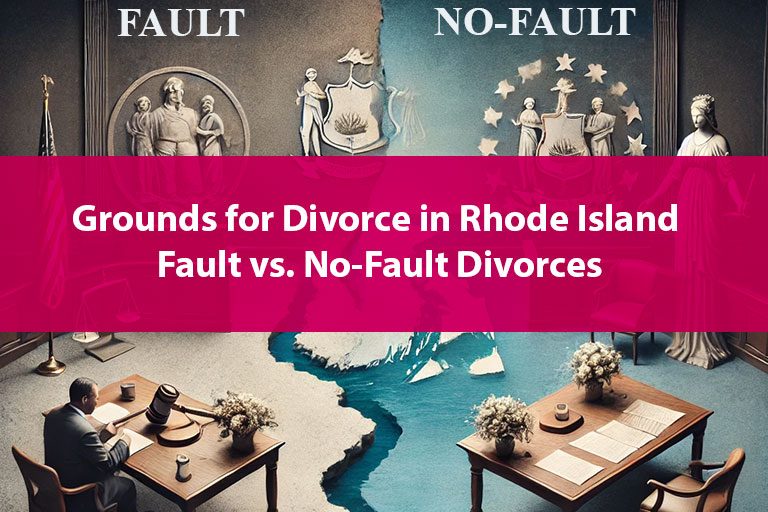
Divorce is a life-changing decision that can feel overwhelming, especially when you’re trying to make sense of the legal process. The best first step you can take is to understand the different grounds for divorce in Rhode Island.
You see, fault and no-fault divorces each come with their own rules and potential outcomes. Knowing what to expect can help you protect your best interests throughout the process.
In this blog, we’ll explain these two types of divorce, how they work, and how they might shape important parts of your case like alimony, custody, and property division.
What Are the Main Grounds for Divorce in Rhode Island?
Rhode Island law recognizes two categories of divorce grounds: fault and no-fault. Fault grounds apply when one spouse’s actions are the primary cause of your marriage’s breakdown. Common fault grounds include:
- Adultery – When one spouse engages in a consensual sexual relationship outside the marriage
- Desertion – When one spouse intentionally abandons the marriage for at least one year continuously without justification
- Extreme cruelty – Acts of physical, emotional, or psychological abuse that make the continuation of the marriage unsafe
- Substance abuse – Chronic alcohol or drug abuse that disrupts your marriage or creates an unsafe environment
- Gross misbehavior or wickedness – Severe misconduct that undermines the foundation of your marriage, such as criminal activities or habitual dishonesty
No-fault grounds, by comparison, allow you to dissolve your marriage without assigning blame. In Rhode Island, the most common no-fault grounds are:
- Irreconcilable differences – A mutual acknowledgment that the marriage has broken down beyond repair
- Living separate and apart – An option if spouses have lived apart for at least three years without reconciliation
Choosing the right ground can influence the overall tone and approach of your divorce proceedings, so it’s essential to consider your unique circumstances carefully.
What is the Legal Definition of Irreconcilable Differences in Rhode Island?
Legally, irreconcilable differences are defined as “the substantial breakdown of a marriage to the extent that the parties cannot reasonably be expected to live together as husband and wife.”
In simpler terms, this means the marriage has broken down so severely that there’s no realistic hope of fixing it, even with counseling or reconciliation efforts. It doesn’t require proving any wrongdoing by either spouse—it’s enough that both agree the relationship is beyond repair.
Think of it as a way for couples to say, “We’ve tried, but it’s just not working anymore,” without assigning blame.
How Does Rhode Island Differentiate Between Fault and No-Fault Divorces?
The primary distinction between fault and no-fault divorces in Rhode Island lies in the legal process and proof required.
Fault divorces often require substantial evidence to prove wrongdoing, such as infidelity or cruelty. These cases may involve:
- Lengthy court hearings
- A higher burden of proof, such as witness testimonies or documentation
- More adversarial proceedings, which can increase emotional and financial strain
No-fault divorces, on the other hand, are generally less contentious. You two have the opportunity to ease the process by mutually agreeing on irreconcilable differences.
And in many no-fault cases, mediation is an effective option. With your attorney and a neutral mediator, you two may reach agreements without extensive—and expensive—litigation.
Ultimately, the choice between fault and no-fault grounds depends on the details of your marriage and whether you’d feel safe while trying to reach a compromise with your spouse.
Can Both Fault and No-Fault Grounds Be Cited in the Same Divorce Case?
Yes, you may cite both fault and no-fault grounds in your divorce case in Rhode Island. Under Rhode Island state law, the court recognizes various fault-based grounds for divorce, such as adultery, extreme cruelty, and willful desertion. Additionally, under Chapter 15-5-3.1, irreconcilable differences are acknowledged as a no-fault ground.
By citing multiple grounds, you provide the court with a comprehensive view of your marriage’s breakdown, which can be beneficial in proceedings.
But this isn’t a decision you should make all on your own—always consult with a legal professional to determine the best strategy for your specific situation.
How Do Grounds Impact Key Aspects of a Divorce?
The grounds cited in your divorce can affect several critical elements, including property division, alimony, child custody, and child support.
Division of Assets
In fault divorces, a spouse’s behavior may influence property distribution. For instance, proven adultery or financial neglect could lead to an unequal division of marital assets.
Alimony
Fault grounds like desertion or extreme cruelty might increase the likelihood of one spouse receiving alimony. Conversely, a spouse found at fault could be denied spousal support.
Child Custody
Fault grounds such as substance abuse or abandonment can significantly impact custody decisions. Courts prioritize the child’s best interests, which means a spouse’s misconduct might limit their custody rights.
Child Support
While child support calculations in Rhode Island are generally based on income and parenting time, fault grounds can sometimes come into play. For example, if one spouse’s actions, such as abandonment or substance abuse, impact their ability to support their child, it may influence the court’s decision on support payments.
How to Choose the Right Path for Your Rhode Island Divorce
Making sense of the divorce process can feel like a lot, but understanding the basics is a powerful first step. Choosing between a fault-based or no-fault divorce depends on your unique situation, and the right path isn’t always obvious.
Fault divorces might seem like a way to hold a spouse accountable, but they often involve more conflict and longer court proceedings.
No-fault divorces, on the other hand, are usually less contentious and faster, which makes them a popular choice for couples who can work together to move forward.
No matter the type of divorce, the decisions you make now will shape your future. That’s why having an experienced attorney by your side is so important. At the Law Office of Susan T. Perkins, we’ll use our decades of experience to guide you every step of the way.
From explaining your options to crafting a strategy that prioritizes your best interests, our team is here to help you navigate this emotional process with confidence and clarity.
Contact us today at 401-PERKINS to schedule your 60-minute free case consultation and take the first step toward a brighter future.



